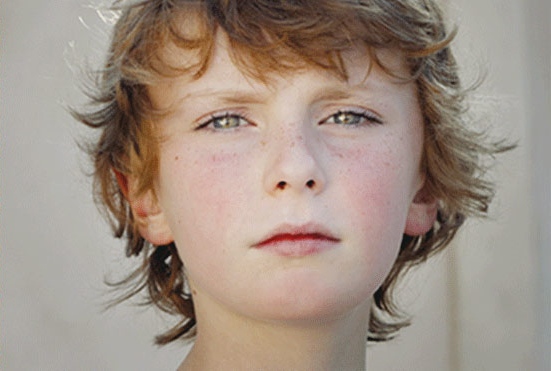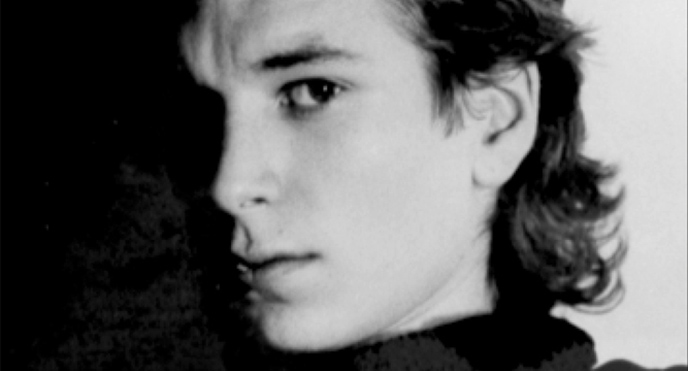My Struggle, vol. 4: Diana, September 15
Dear strugglers,
A shameful confession: via Twitter DM (seemingly the only form of non-work communication I readily respond to these days), Dan and I agreed I'd keep writing these letters on the conditions I give up entirely on attempting to read Knausgaard, a task I might have enjoyed in a different time and place. (Omari's letter makes me wish I had read Book 4, as I love to re-read earlier scenes in light of new info, to have my sense of the story upset). But through some combination of work, personal Feels, and failure of habits, I find myself totally unable to read: as I write, I'm not even reading a better book in lieu of My Struggle, I'm instead watching TV as trashy as "Millionaire Matchmaker" in an attempt to obliterate my mind.
The show's a funny countertext, in terms of gender: the matchmaker, Patti, mostly finds broke hot young women as potential dates for rich dude clients, but in the occasional episode where the millionaire is a straight woman, she still insists that the man plan the date. The darkest episode so far involved setting up a "millionairess" who found herself "bicurious" after learning her ex-husband was cheating; Patti introduces her to women and men in order to help her see she's not queer, she's just hoping women won't hurt her so bad.
It's a pleasure to see the way fiction borrows from psychological causality—because my dad was a bad man, I struggle to be a good man, too—play out in reality TV: because my ex was a dick, I'm giving pussy a chance.
Since I wasn't reading something good instead of reading Knausgaard last week, I'll tell you something I did instead: I handed my phone to my friend Monica and let her message whomever she wanted on Tinder, with the caveat that she follow comedy's rule for cruelty: to "aim up," i.e. to save any teasing for the straight white boys.
Dan says of Karl Ove: "Behind those stoic eyes there's a boy who wants a whipping." And across the board, the men who wrote back played along with her messages: "How sexist are you, on a scale of 1-10? 1 being sexist. 10 being sexist." The hapless gentleman replies: "Am I supposed to be? I guess 5."
I take her phone, too, decide to respond to a man who has negged her: he tells her she looks like the kind of writer whose work doesn't get published. I ask him to give up, to admit he wants to submit to a woman who is better than him, to quit pretending he wants to take charge. I wait for whatever violence seems predictable, a part of the game, but he disappoints and gives in. Monica takes her phone back:
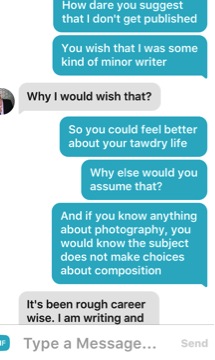
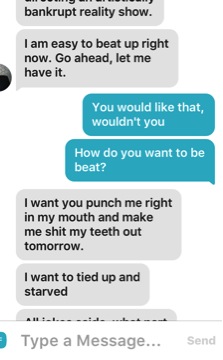
Because I believe in the paranoid connections of fiction, I'm confident that Brian writes for Millionaire Matchmaker. His career isn't working, he's feeling insecure. He tried first making a woman feel smaller; now that he's admitted his own smallness, he begs her to top him.
"All straight men are subs," Monica advises.
Maybe this is my annoyance with K.: I want to submit to the masochism of reading these few thousand pages, but he wants to submit, too.
I could circle back here to my writing on Knausgaard's fear of being a bottom in vol. 1; Karl Ove's narration is as ambivalent about control as the character is about masculinity.
When I started writing this letter, I was still thinking through yours: how I ought to be able to identify with all this childhood longing to become a famous writer, with the "wallowing in shame," with Karl Ove's desire to reveal all the thing he's ashamed of. But there's such a desire to be loved at the bottom of his narration, such an attempt to escape the shame that's shared. It's the sub who wants to be told he's a good boy, but who never learns to be good—tell me my interestingly-long descriptions eliminate, via self-reflection, this normal guilt.It's a triumph of personal well being that, in the intervening days, I found myself able to read again, in the same way I have for the past year: by starting another Ferrante book. This one, The Lost Daughter, is perhaps the most brutal. It took me out of a state I needed to gtfo of, for sure, but it also circled me back to you: here's a narrator who does awful shit for no obvious reason, is often classist and cruel and petty and childish. Her explanation for abandoning her children, a fact she shares initially not with the reader, but with a pregnant woman in the toy store whose feelings she's trying to hurt: "Sometimes you have to escape in order not to die." Ferrante is a cruel stylist. The sentences that break your heart interrupt scenes that seemed to have been building to some other narrative tension, and often come with little supporting description. There's a curtness that can be vicious, even in the long descriptive passages of My Brilliant Friend. Right now, I'm finding this cruelty more comforting than Karl Ove's and Brian's playing at masochism: sometimes, a sub is just a man who doesn't want to take responsibility, who knows he should probably shut up, but needs a woman to make him.
This letter is about something other than My Struggle. Maybe it's about one of my struggles, which my roommate, Shiv, is here to help me solve:
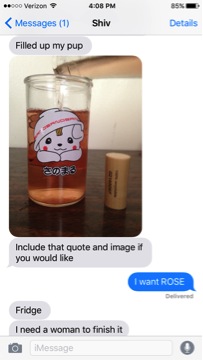
Yours, childishly,
Diana
ALSO IN THIS SERIES:
The Slow Burn, v.2: An Introduction
My Struggle, vol. 1: Cecily, June 6
My Struggle, vol. 1: Diana, June 9
My Struggle, vol. 1: Omari, June 14
My Struggle, vol. 1: Dan, June 17
My Struggle, vol. 2: Omari, June 24
My Struggle, vol. 2: Cecily, July 1
My Struggle, vol. 2: Sarah Chihaya, July 5
My Struggle, vol. 2: Dan, July 12
My Struggle, vol. 2: Diana, July 16
My Struggle, vol. 2: Jess Arndt, July 18
My Struggle, vol. 3: Omari, July 25
My Struggle, vol. 3: Ari M. Brostoff, August 1
My Struggle, vol. 3: Dan, August 4
My Struggle, vol. 3: Jacob Brogan, August 8
My Struggle, vol. 3: Diana, August 12
My Struggle, vol. 4: Katherine Hill, August 25
My Struggle, vol. 4: Omari, September 1
My Struggle, vol. 4: Dan, September 2
My Struggle, vol. 4: Diana, September 15
My Struggle, vol. 5: Omari, September 27
My Struggle, vol. 5: Diana, October 3
My Struggle, vol. 5: Dan, October 13



